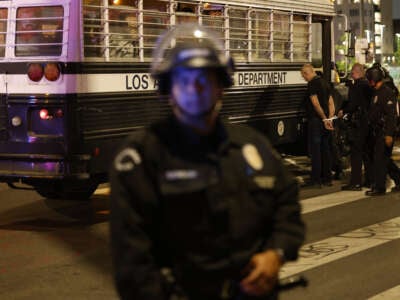Organizers say about 5 million people participated in “No Kings” protests against President Donald Trump and his administration’s abuses of power in hundreds of towns and cities across the United States on Saturday, June 14. Demonstrations large and small offered a sharp rebuke to Trump’s decision to deploy the military in response to protests against immigration raids in Los Angeles, and now activists from various movements are moving to harness the backlash into a sustained movement capable of toppling Trumpian authoritarianism.
The “No Kings” protests were inspired by the 3.5 percent principle, which posits that movements against authoritarianism that engage 3.5 percent of the population have never failed to bring about change. The demonstrations provided people with a venue to call out Trump for his implementation of cruel and extreme policies that are tearing apart families and spreading fear in communities nationwide. The mass turnout of protesters nationwide also drowned out Trump’s efforts to boost his strongman image by wasting up to $45 million in public funds to throw a gaudy military parade in Washington, D.C., on his birthday (June 14).
Participants in the mass protests condemned the cruelty of Trump’s mass deportation campaign, which is targeting law-abiding parents and schoolchildren. Protesters also decried the cuts proposed by Republicans in Congress to many of this country’s basic safety net programs — cuts proposed to pay for Trump’s signature tax cuts, which primarily benefit the wealthy. On top of these cruel policies are Trump’s own autocratic behavior, vile rhetoric, and decadent displays of rank nationalism — including the president’s decision to use the U.S. Army’s anniversary celebration as an excuse to throw an ostentatious parade and made-for-TV propaganda starring himself.
Don’t miss a beat
Get the latest news and thought-provoking analysis from Truthout.
The demonstrations marked one the largest single days of protest in U.S. history, according to Joe Dinkin, deputy national director of the Working Families Party.
“In America we don’t have kings, and Trump’s abuses of power are generating a counterreaction,” Dinkin said in an interview. “People are not liking what they are seeing from the administration. They don’t like the attacks on civil rights, the attacks on Medicaid, and the attacks on food assistance — that is what is generating enormous backlash.”
The proposed cuts to programs on which people depend stand in sharp contrast to the decadent parade Trump held on June 14. On Capitol Hill, 60 veterans and military family members were arrested for staging a sit-in to protest against the parade and Trump’s politicization of the Army.
“As veterans we were able to break into the mainstream narrative about Trump’s birthday parade and assert that Americans want ‘money for people not parades,’” wrote Brittany Ramos DeBarros, an organizing director with About Face: Veterans Against the War, in a newsletter on Monday. DeBarros added, “These kinds of ‘celebrations’ of military might while our military is being used to terrorize immigrants in LA and starve children in Palestine is beyond grotesque.”
People are also upset over Trump’s show of force in LA, where the administration responded to protests last weekend by deploying U.S. Marines and National Guard troops in defiance of state and local leaders. With his constituents angry and fearful, Sen. Alex Padilla (D-California) attempted to ask questions during a press conference inside a federal building held by Department of Homeland Security Secretary Kristi Noem but was quickly tackled by officers and handcuffed.
Instead of apologizing, Noem doubled down, claiming the sitting U.S. senator failed to identify himself — inside a federal building in his home state. After a week of sensational news coverage and partisan attacks, support for Trump’s approach to immigration began to slip in the polls. Americans were also uncomfortable with the president sending in the military to U.S. cities, with 47 pluralities telling pollsters they oppose Trump’s moves in LA.
Dinkin said it is critical that people are showing up for protests at a time when the Trump administration has literally arrested Democratic politicians for questioning about the immigration crackdown, including Newark Mayor Ras Baraka and Rep. LaMonica McIver in New Jersey. In LA, police roughed up and arrested union leader David Huerta for protesting peacefully against immigration raids last week.
“We need people to be brave in the face of authoritarianism,” Dinkin said. “From here, we continue getting organized in our communities in order to throw them out of power in the midterms and remove [Trump] from office pretty soon after that. The elections are the best way we have to remove this authoritarian threat, and getting organized in our communities is the way that we do that.”
Dinkin said the work of organizing against authoritarianism will look different in different places. For example, people in red districts must continue to hold town halls and confront Republican members of Congress over proposed safety net cuts and their refusal to rein in Trump’s abuses of executive authority.
“In other jurisdictions it might mean stepping up to run for local office yourself, helping to get educated on your rights; it might mean joining economic boycotts out there, such as the Target boycott,” Dinkin said.
Dinkin said the Working Families Party is running 1,000 working-class candidates up and down the ballot in various states this year and next, and voting remains a major bulwark to authoritarianism. The challenge is rebuilding trusting relationships with each other despite the fractures in society created as Trump has sought to divide and conquer.
“It’s Trump and it’s also the media environment that increasingly has people captured in feuds that only tell them what they want to hear, that is growing at the same time as a decline in participation in civic organizations and decline in the strength of the unions,” Dinkin said. “These are the things that really connect us in trusting relationships, and that is what we mean by organizing relationships of trust.”
Urgent appeal for your support: Help us fight political repression.
Truthout urgently appeals for your support. Under pressure from an array of McCarthyist anti-speech tactics, independent journalists at Truthout face new and mounting political repression.
We rely on your support to publish movement journalism — in fact, we’re almost entirely funded by readers like you. Yet, donations are down at this moment of crisis. We may end this month in the red without additional help, so we’ve launched a fundraiser.
We have 10 days to hit our $50,000 goal. Please contribute a tax-deductible gift to Truthout at this critical moment.
Read full article at source
Stay informed about this story by subscribing to our regular Newsletter


